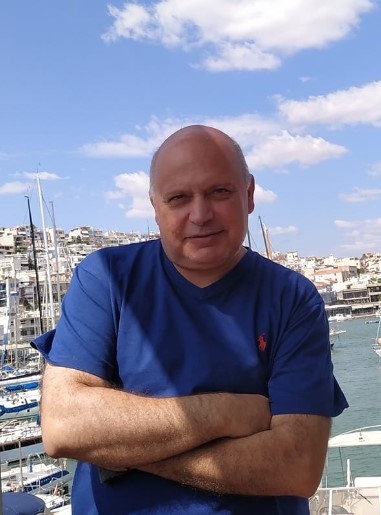PAPERS IN CONFERENCES
- K Kokkinos, A Exadactylos, D Vafidis, “Use of Salmon Maturity Classification Based on Bayessian Networks and Support Vector Machines Methodologies”, 4th International Congress on Applied Ichthyology, Oceanography & Aquatic Environment, Mytilini, Greece, Nov. 4th – 6th, 2021.
- K Kokkinos, A Exadactylos, D Vafidis, “Use of Fuzzy Cognitive Maps as a Decision-Making Tool to Fisheries Management”, 4th International Congress on Applied Ichthyology, Oceanography & Aquatic Environment, Mytilini, Greece, Nov. 4th – 6th, 2021.
- M Hatziioannou, A Doxarioti, K Apostolou, A Exadactylos, K Kokkinos, “Life Cycle Assessment of Small Snail Farming Systems: The Greek Case”, 4th International Congress on Applied Ichthyology, Oceanography & Aquatic Environment, Mytilini, Greece, Nov. 4th – 6th, 2021.
- Konstantinos Kokkinos, A. Exadactylos, D. Vafidis, & M. Hatziioannou, “Efficient Traceability of Aquatic Products on the Cold Supply Chain Management via IoT and Artificial Neural Networks”, 3rd International Congress on Applied Ichthyology & Aquatic Environment, Volos, Greece Nov. 8th – 11th, 2018.
- Konstantinos Kokkinos and Nicholas Samaras, “A novel integrated platform for the monitoring of cold supply chains via IoT, fuzzy logic and adaptive neuro fuzzy inference systems”, Proceedings of the International scientific and practical conference “Bulgaria of regions”, Plovdiv, Bulgaria Oct. 2018.
- Konstantinos Kokkinos, E. Lakioti, P. Samaras and V. Karayannis, “Stakeholders’ Perception of Sustainability Key Performance Indicators for Urban Water Quality, using Soft Computing Methodologies”, Fifth International Conference on Small and Decentralized Water and Wastewater Treatment Plants, Thessaloniki Greece, August 26th-29th, 2018.
- Konstantinos Kokkinos, Eftihia Nathanail and Elpiniki Papageorgiou, “Applying Unsupervised and Supervised Machine Learning Methodologies in Social Media Textual Traffic Data”, International Conference on Sustainable Urban Mobility, May 24th -26th, 2018, Skiathos, Greece.
- Dimitrios Kofinas, Elpiniki Papageorgiou, Chrysi Laspidou, Nikolaos Mellios and Konstantinos Kokkinos, “Daily multivariate forecasting of water demand in a touristic island with the use of artificial neural network and adaptive neuro-fuzzy inference system”, 2016 International Workshop on Cyber-physical Systems for Smart Water Networks (CySWater), April 2016, DOI: 10.1109/CySWater.2016.7469061.
- Konstantinos Kokkinos, N. Samaras, A. Loukas “An Integrated Modeling Architecture for the Monitoring of Lake Karla Watershed”, Fifth International Conference on Environmental Management, Engineering, Planning and Economics, (CEMEPE 2015) and SECOTOX Conference, June 14th-18th, 2015 Mykonos Island, Greece.
- Konstantinos Kokkinos, N. Samaras, N. Mylopoulos, C. Laspidou, A. Loukas “The Coupling of the Hydrological Models UTHBAL, UTHRL, MODFLOW and the Environmental Model PCLake under a Collaborative Modeling Framework for Water Resources Management of the Lake Karla Watershed”, Fifth International Conference on Environmental Management, Engineering, Planning and Economics, (CEMEPE 2015) and SECOTOX Conference, June 14th-18th, 2015 Mykonos Island, Greece.
- Konstantinos Kokkinos, N. Samaras, C. Laspidou, A. Loukas, Modeling of Hydrological and Ecological Processes through OpenMI and Web Services, 3rd Global Academic Meeting, GAM 2015, Health, Climate Change and Environment-Global Societal Challenges, New York Sept. 17th-19th, 2015, New York, USA.
- Konstantinos Kokkinos, A. Loukas, N. Mylopoulos, N. Samaras, Collaborative Environmental Modeling: A Roadmap for Integrated Water Resources Management, CEST International Conference on Environmental Science and Technology, Sept. 3rd-5th, 2015 Rhodes Island, Greece.
- A. Loukas, J. Tzabiras, M. Spiliotopoulos, Konstantinos Kokkinos, C. Fafoutis, N. Mylopoulos “Development of a district information system for water management planning and strategic decision making”, Proc. SPIE 9535, Third International Conference on Remote Sensing and Geoinformation of the Environment (RSCy2015), 95351L (June 19, 2015); doi:10.1117/12.2193892, Budapest, Hungary.
- Vasiliades, L., P. Sidiropoulos, J. Tzabiras, Konstantinos Kokkinos, M. Spiliotopoulos, G. Papaioannou, C. Fafoutis, K. Michailidou, G. Tziatzios, A. Loukas and N. Mylopoulos (2015). “An Integrated Monitoring and Management System for Quantity and Quality Assessment of Water Resources in Rural Basins.” 9th World Congress of EWRA “Water Resources Management in a Changing World: Challenges and Opportunities”, 10-13 June 2015, Istanbul, Turkey.
- Vasiliades, L., P. Sidiropoulos, J. Tzabiras, G. Papaioannou, Konstantinos Kokkinos, A. Loukas and N. Mylopoulos (2015). “An Integrated Modelling System for Assessing Water Resources Management Practices.” 9th World Congress of EWRA “Water Resources Management in a Changing World: Challenges and Opportunities”, 10-13 June 2015, Istanbul, Turkey.
- Vasiliades, L., P. Sidiropoulos, J. Tzabiras, Konstantinos Kokkinos, M. Spiliotopoulos, G. Papaioannou, C. Fafoutis, K. Michailidou, G. Tziatzios, A. Loukas and N. Mylopoulos (2015). “Hydromentor: An Integrated Water Resources Monitoring and Management System at Modified Semi-Arid Watersheds.” EGU General Assembly, 12-17 April 2015, Vienna, Austria.
- Tzabiras, J., M. Spiliotopoulos, Konstantinos Kokkinos, C. Fafoutis, P. Sidiropoulos, L. Vasiliades, G. Papaioannou, A. Loukas and N. Mylopoulos (2015). “A GIS Based Watershed Information System for Water Resources Management and Planning in Semi-Arid Areas.” EGU General Assembly, 12-17 April 2015, Vienna, Austria.
- Konstantinos Kokkinos and D. Ventzas, “Collaborative monitoring of Traffic in Intersections using video and Image Processing”, Second International Conference on Advances in Computing, Electronics and Communication ACEC, Zurich Switzerland, 25 Oct. 2014.
- Κonstantinos Kokkinos, N. Mellios, D. Kofinas, C. Laspidou, and A. Loukas, “The development of a Collaborative Environmental Modeling System for the communication between models UTHBAL and PCLake”, Fourth International Symposium on Green Chemistry for Environment, Health and Development, September 24th-26th, 2014, Kos Island, Greece
- Nicholas Samaras and Konstantinos Kokkinos, “On Data Dissemination Performance of Routing Algorithms in Vehicular Ad hoc Networks (VANETs)”, submitted for publication for the Third International conference on Connected Vehicles and Expo, Nov. 3-7, 2014 Vienna, Austria.
- Konstantinos Kokkinos, N. Samaras, A. Loukas, N. Mylopoulos, “A Collaborative Approach to Environmental Modeling”, proceedings of WETICE 2014, IEEE International Workshop on Enabling Technologies: Infrastructures for Collaborative Enterprises, Parma, Italy, Jun. 23-25, 2014. IEEE Computer Society 2014, ISBN 978-1-4673-1888-4.
- A. Loukas, J. Tzabiras, M. Spiliotopoulos, Konstantinos Kokkinos, C. Fafoutis and N. Mylopoulos, "Development of a district information system for water management planning and strategic decision making", Second International Conference on Remote Sensing and Geoinformation of Environment, Cyprus, 7-10 April , 2014.
- Nicholas S. Samaras, Konstantinos Kokkinos, Vasileios Vlachos, Costas Chaikalis, “On Intrusion Detection in Opportunistic Networks”, accepted for publication in Pan-Hellenic Conference on Informatics, 19th-21st September, Thessaloniki, Greece, 2013.
- Konstantinos Kokkinos, Eleftherios Papadopoulos, Nicholas S. Samaras, Costas Chaikalis “An Integrated Modeling Framework for Routing of Hazardous Materials", proceedings of WETICE 2012, IEEE International Workshop on Enabling Technologies: Infrastructures for Collaborative Enterprises, Toulouse, France, Jun. 25-27, 2012. IEEE Computer Society 2012, ISBN 978-1-4673-1888-4.
- Konstantinos Kokkinos, Loukas Ath., Samaras Nich., and Iatrellis Om. “Integrated Modeling of Hydrological Processes through OpenMI and Web Services” HAICTA-2011 5th International Conference on Information and Communication Technologies in Agriculture, Food and Environment, Skiathos Greece Sept 8th – 11th 2011.
- Konstantinos Kokkinos, Loukas Ath., “Collaborative Migration, Coupling and Simulation of Water Resources Models through OpenMI”, accepted for publication in the proceedings of WETICE 2010, IEEE International Workshop on Enabling Technologies: Infrastructures for Collaborative Enterprises, Larissa Greece, June 28th -30th 2010.
- Chaikalis Kons., Samaras Nic., Iatrellis Om. Konstantinos Kokkinos, “An Improved 3GPP Reconfigurable Turbo Decoder for Flat Rayleigh Fading Channels” accepted for publication in the proceedings of TEMU 2010, International Conference on Telecommunications and Multimedia, Chania Crete, Greece July 14th-16th 2010.
- Loukas Ath., Konstantinos Kokkinos, Vassiliades L. and Liakopoulos Ant, “ The Migration of the UTHBAL Hydrologic Model into OpenMI”, in proceedings of the International Congress on Environmental Modelling and Software, IEMSS, Barcelona Spain, July 5-10, 2008.
- Konstantinos Kokkinos, Loukas Ath. Vassiliades L and Liakopoulos Ant, “Integrated Modelling of Surface Water and Ground Water Through OpenMI : The Case of Lake Karla Watershed”, submitted for publication to the International Congress on Environmental Modelling and Software, IEMSS, Barcelona Spain, July 5-10, 2008.
- Elise de Doncker, Konstantinos Kokkinos, Rodger Zanny and Karlis Kaugars “Parallel Multivariate Integration: Paradigms and Applications”, Joint Statistical Conferences (JSM’2001, CD-ROM Proceedings), pp. 538-543, 2002.
- Konstantinos Kokkinos and Dionysios Kountanis, “Properties of Regular Uniform k-Stratified Graphs”, Congressus Numerantium Conference, Boca Raton, Florida, USA, Vol. 147, Pages 117-128, 2000.
- Konstantinos Kokkinos and Dionysios Kountanis, “Approximations to Rectilinear Steiner Trees on a Z-Cube”, Congressus Numerantium Conference, Boca Raton, Florida, USA, Vol. 128, Pages 205-218, 1996.
- Subhash Sonnad, Laura Nichols, Konstantinos Kokkinos, Pam Zeller, Dennis Malaret-Rosado and Jassim Nasr, “Process Evaluation Simplified: A Computerized Approach”, National Conference for Community Partnership Grantees, St. Louis, MO, March, 1995. Published in Conference Proceedings Vol 84 pp. 346-366 February 1996.
- Dionysios Kountanis and Konstantinos Kokkinos, “Approximation Algorithms for the Query Optimization Problem for a Cellular Multilist File Organization”, Journal of Computing and Information (JCI), Special Issue: Proceedings of the Seventh International Conference of Computing and Information (ICCI’95), Vol. 32, Pages 600-612, 1995.
- Dionysios Kountanis and Konstantinos Kokkinos, “A Balanced Approach to the Rectilinear Steiner Problem”, Congressus Numerantium Conference, Boca Raton, Florida, USA, Vol. 108, pp. 205-221, 1995.
- Dalia Motzkin and Konstantinos Kokkinos, “The Relational Model and Minimum Covers Revisited”, Joint Conference on Information Systems, South Carolina, Nov. 1994, Proceedings pp. 314-321.







